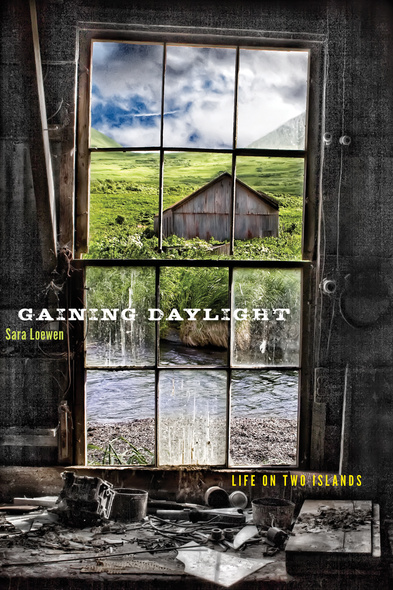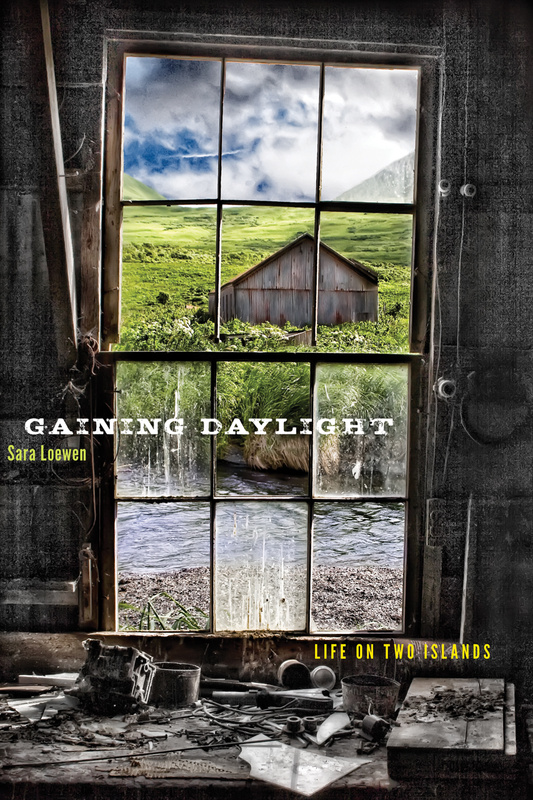Gaining Daylight
Life on Two Islands
By Sara Loewen
SERIES:
The Alaska Literary Series
University of Alaska Press
For many the idea of living off the land is a romantic notion left to stories of olden days or wistful dreams at the office. But for Sara Loewen it becomes her way of life each summer as her family settles into their remote cabin on Uyak Bay for the height of salmon season. With this connection to thousands of years of fishing and gathering at its core, Gaining Daylight explores what it means to balance lives on two islands, living within both an ancient way of life and the modern world. Her personal essays integrate natural and island history with her experiences of fishing and family life, as well as the challenges of living at the northern edge of the Pacific.
Loewen’s writing is richly descriptive; readers can almost feel heat from wood stoves, smell smoking salmon, and spot the ways the ocean blues change with the season. With honesty and humor, Loewen easily draws readers into her world, sharing the rewards of subsistence living and the peace brought by miles of crisp solitude.
Loewen’s writing is richly descriptive; readers can almost feel heat from wood stoves, smell smoking salmon, and spot the ways the ocean blues change with the season. With honesty and humor, Loewen easily draws readers into her world, sharing the rewards of subsistence living and the peace brought by miles of crisp solitude.
Winner, Creative Nonfiction
Loewen's essays are exquisite slices of life . . . this solemn, spare book is an intimate and loving look at a life that very few people live.'
With quiet grace, Lowen writes of her children, marriage, and home and her place within it. More pragmatic than romantic, this is what life in Alaska is really about.
[Gaining Daylight] is a wonderful debut that deftly spans Loewen’s own inner and Alaskan geographies with a rare intimacy, elegance, and steadfastness. Like the tides on Uyak Bay, the essays move with a certain rightness and loveliness, a definite rhythm—and so we are moved by them.
Here’s to a fresh new northern voice. Sara Loewen’s brilliant collection is like a seafood feast; instead of salmon, cod, and seaweed salad, we’re treated to stories of growing up in the freedom of a Kodiak Island village, summers at a remote fishing site, mothering boys at the edge of the sea, and various historical events that shaped life on the islands Loewen knows as home. Loewen’s writing is smart, honest, and gorgeously lyrical. Like fish scales stuck to rubber boots, these stories will last as reminders of the importance of place, family, and all that anchors us.
Reading Sara Loewen’s memoir, Gaining Daylight: Life on Two Islands, you will learn a lot about Kodiak, Alaska, past and present, but mostly, you will be spending time with a bright, funny, observant, lifelong Alaskan, a young mother married to a fisherman. Sara has a story to tell, and she does it so well you won’t realize until you are done with Gaining Daylight how much she has taught you about living a good life, no matter which island you call home.
These essays are about what’s universal in human experience: friendship, marriage, community, questions of one’s place and purpose in life, how raising children alters a woman’s sense of identity. At the same time, they depict the possibility of an expanded identity in a place where a family works together to make a living from the sea. Her powerful yet quiet, humble and eloquent voice guides a reader, whether it be an Alaskan reader, or a reader in New York City, through a foreign landscape into familiar inner terrain.
Sara Loewen teaches writing at Kodiak College during the winter and spends the summer in Uyak Bay with her husband and two sons, where they fish commercially for salmon.
Preface
Giant Wings
December
Woman Overboard
To Know a Place
Capacious
Unsinkable
The Wait
Hunger & Thirst
Homing
A Lake By Any Other Name
Elementary Love
Pacific Sandwiches
Winter in June
Hometown Ode
Sea Chains Broken
Fifteen Times over the Bridge
Red Caviar
The Simple Life
The Outlaws of Amook Island
Cardinal Points
Acknowledgments
Sources
Notes & Photo Credits





